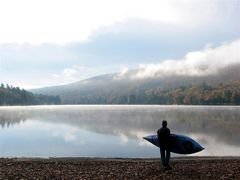I spent last weekend doing this training course with Kayakojacko on the Thames at Chiswick. I was not quite sure what to expect but hoped it would be fun and I was not disappointed.
We spent Saturday morning going over our own technique and getting an introduction to how to teach others the paddle strokes which most of us do without thinking. The instructors gave us some useful tools for breaking down the strokes and for working with novices to pass them on. For example, the 'IDEAS' framework whereby the coach gives an Introduction to the stroke explaining when it is used and why it is important followed by a Demonstration, an Explanation of the components of the stroke, some practice Activity for the students and then a Summary. It sounds obvious but it very quickly gave us a template that helped develop teaching routines for each of the strokes.
Over lunch we talked about some coaching philosophies including the complimentary use of coach centred and student centred learning with an emphasis on the value of the later, for example, by setting up a game that helps to teach the student a technique on their own.
In the afternoon we tried some scenarios involving coming up with ways to teach a stroke to a blind or deaf paddler which gave us some insights about how to use sound and touch in creative ways.
After the obligatory rescue practice, we got warm and dry before sitting down to plan a coaching session for the next day. We had no real novices to coach, so the plan was to split into groups with each group taking responsibility for planning and running an hour's worth of training for the others with the emphasis on safety, fun and learning.
Our group was on first and had the job of getting people kitted out then doing a warm up and safety briefing before getting them on the water and giving some instruction in forward paddling. I think we were all a little nervous but the previous day's planning really helped to give us a structure to work to and the session ran smoothly. After everyone had taken their turn at running a different part of a marathon coaching session we had lunch and a debrief.
The debriefing took the form of a group session followed by individual sessions for each of us with the team of instructors and it proved to be a very valuable part of the course, particularly the peer feedback on our coaching performance. I think we all learned a lot that might otherwise have taken many coaching sessions working on our own to figure out.
Before the course I had wondered how I was going to learn to be a coach in a weekend and was unsure about how I could teach good technique without a lot of technical knowledge. I have come away with a greater confidence in my own technique and a lot of tools to use in my coaching. I can now see how, over the next few months, I can use this experience to become a coach.
Many thanks to Jacko, Julie and Chris for their enthusiasm and commitment to coaching which made for a first class course.
 Lower Baker Pond, New Hampshire at 9:15 this morning - perhaps not the most exciting spot to paddle but it was delightful none the less. The temperature was just below freezing and there were wisps of fog blowing over the surface of the water as the sun tried to break through. We paddled around the pond exploring all the nooks and crannies, drinking in the cold crisp air and the beautiful fall colors all around us.
Lower Baker Pond, New Hampshire at 9:15 this morning - perhaps not the most exciting spot to paddle but it was delightful none the less. The temperature was just below freezing and there were wisps of fog blowing over the surface of the water as the sun tried to break through. We paddled around the pond exploring all the nooks and crannies, drinking in the cold crisp air and the beautiful fall colors all around us.